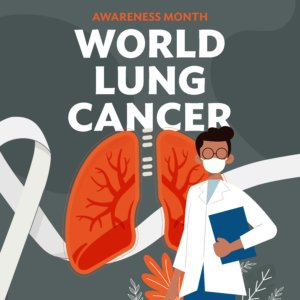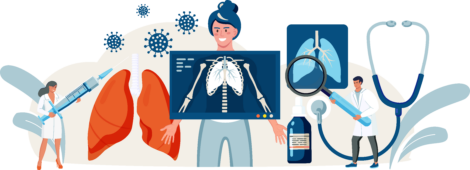2023 Lung Cancer Awareness Blog
As the third most common type of cancer in the United States, lung cancer causes more deaths than any other cancer in the country (American Lung Association, 2021).
In honor of World Lung Cancer Awareness Month and National Lung Cancer Screening Day, the National Behavioral Health Network for Tobacco and Cancer Control is committed to raising awareness about reducible risks for lung cancer among individuals with mental health and/or substance use (MH/SU) challenges.
Commercial tobacco use, responsible for 90% of lung cancer cases in the U.S., is the leading cause of preventable disease, death and disability in the country (CDC, 2022). This is particularly alarming for individuals with MH/SU challenges, as they are more likely to smoke commercial tobacco. While 25% of the U.S. adult population has a MH/SU challenge, they consume nearly 40% of cigarettes smoked across the nation (NAMI, 2021). These rates are especially damaging for at-risk populations that experience significant health care and social inequities, such as LGBTQ+, low-income and BIPOC (Black, Indigenous, people of color) communities. Despite these statistics, there are steps health care providers and public health professionals can take to reduce the risk of lung cancer for individuals with MH/SU challenges.
Behavioral health providers and public health professionals play a crucial role in addressing tobacco- and cancer-related disparities by encouraging clients and communities to quit or reduce their smoking, which drastically decreases the risk of developing lung cancer (Johns Hopkins Medicine, n.d.). Smoking cessation efforts, including nicotine replacement therapies (NRTs), motivational interviewing and the inclusion of peer-support specialists, can be leveraged to aid individuals looking to recover from commercial tobacco use. Policymakers and community partners can reduce the harmful impact of smoking by adopting comprehensive tobacco-free policies, increasing local tobacco taxes and educating their population on the harms of commercial tobacco use.
While preventive measures are vital, early detection can go a long way in improving cancer care and treatment outcomes. This is particularly true for individuals at high risk due to a history of heavy smoking or recent recovery (within the last 15 years), significant exposure to secondhand smoke, or age between 55 and 80 (Johns Hopkins Medicine, n.d.). Individuals with MH/SU challenges may be more apprehensive about seeking out preventive care, but providers should emphasize that screening for at-risk individuals can detect cancer at a more treatable early stage, drastically increasing the chance of positive health outcomes.
Despite a global lag in the adoption of lung cancer screening programs, these initiatives have proven to be effective in reducing lung cancer-related mortality (Leiter et al., 2023). Given the continued high prevalence of smoking in individuals with MH/SU challenges, the National Behavioral Health Network for Tobacco and Cancer Control remains committed to championing lung cancer awareness and prevention efforts. We look forward to continuing this work and are pleased to share these lung cancer resources available through our network and partners.
Lung Cancer Facts
- Lung Cancer (World Health Organization)
- Lung Cancer Disparities (American Lung Association)
- State of Lung Cancer 2020 Report (American Lung Association)
Lung Cancer Screening Resources
- Lung Cancer Risk Quiz – Determine Eligibility for Screening (American Lung Association)
- Screening for Lung Cancer: 2023 Guideline Update (American Cancer Society)
- Lung Cancer Screening Locator Tool (American College of Radiology)
- Lung Cancer Screening (Mayo Clinic)
Tobacco Cessation Resources
- Smoking Cessation Therapies Benefit Substance Use Disorder Clients (National Institute on Drug Abuse/Substance Abuse and Mental Health Services Administration)
- A Practical Guide to Help Your Patients Quit Using Tobacco (Centers for Disease Control and Prevention)
- You Can Help Your Patients Quit Tobacco Use (CDC)
- The Community Guide (Community Preventive Services Task Force)
- Taking Mental Health and Substance Use Organizations Tobacco-Free: A Resource Guide
Sources
American Lung Association. (2021, October 4). Lung cancer basics. https://www.lung.org/lung-health-diseases/lung-disease-lookup/lung-cancer/basics
Centers for Disease Control and Prevention. (2022, August 22). Tobacco-related mortality. https://www.cdc.gov/tobacco/data_statistics/fact_sheets/health_effects/tobacco_related_mortality/index.htm#:~:text=Cigarette%20smoking%20causes%20premature%20death%3A%201%20Life%20expectancy
Johns Hopkins Medicine. (n.d.). Lung cancer prevention. https://www.hopkinsmedicine.org/health/conditions-and-diseases/lung-cancer/lung-cancer-prevention
Leiter, A., Veluswamy, R. R., & Wisnivesky, J. P. (2023, July 21). The global burden of lung cancer: Current status and future trends. Nature Reviews Clinical Oncology, 20, 1–16. https://doi.org/10.1038/s41571-023-00798-3
National Alliance on Mental Illness. (n.d.) Smoking. https://www.nami.org/About-Mental-Illness/Common-with-Mental-Illness/Smoking



